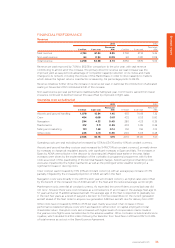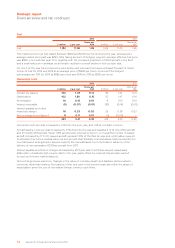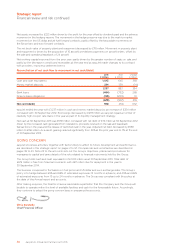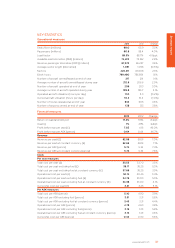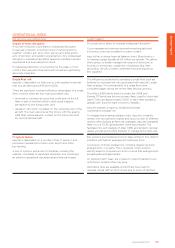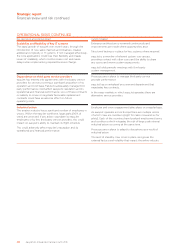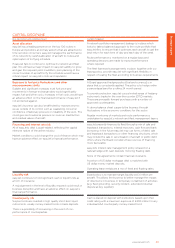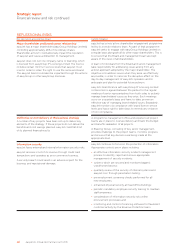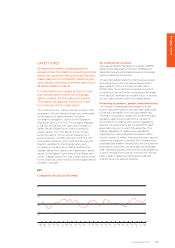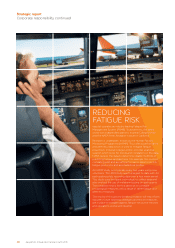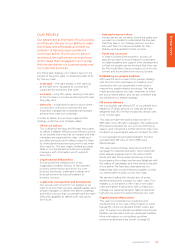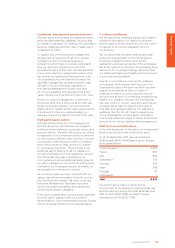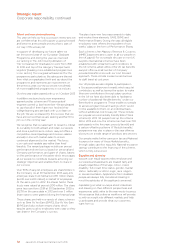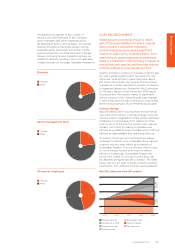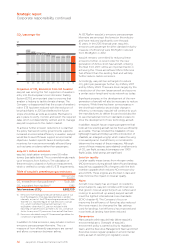EasyJet 2013 Annual Report Download - page 45
Download and view the complete annual report
Please find page 45 of the 2013 EasyJet annual report below. You can navigate through the pages in the report by either clicking on the pages listed below, or by using the keyword search tool below to find specific information within the annual report.
43
www.easyJet.com
Strategic report
REPUTATIONAL RISKS CONTINUED
Risk description and potential impact Current mitigation
Bribery Act
The Bribery Act came into force in July 2011. To date, there have
only been a few precedents set in respect to how this will be
enforced with respect to corporations (although no corporate
prosecutions have been made as at 30 September 2013). As
with all companies, if easyJet were found to be in breach of
the Act, this could adversely affect easyJet’s reputation and
financial performance.
easyJet has a strong ethical tone from the top.
The adoption of appropriate anti-bribery controls has been
a key point of focus for the legal compliance programme at
easyJet. These have included:
• completion of risk assessments to determine specific
compliance needs;
• introduction of new policies, including an anti-bribery and
corruption policy;
• development of an online training module and mandatory
training for all managers and administrative employees in the
UK and across the easyJet network;
• targeted face-to-face training for employee groups perceived
as higher risk; and
• the adoption of standard anti-bribery clauses for inclusion
in supplier contracts.
In addition, as part of easyJet’s evaluation of the new
generation of short-haul engine technology, additional controls
and monitoring have been implemented including a more
restrictive gifts and hospitality policy, enhanced recording of
contact with potential suppliers, assurance visits to assess
standards of anti-bribery controls of potential suppliers and
close monitoring of the completion of mandatory compliance
training. These extra controls have been the subject of
monitoring by an independent third party auditor.
EXTERNAL RISKS
Risk description and potential impact Current mitigation
Competition and industry consolidation
easyJet operates in competitive market places against both
flag carriers and other low-cost airlines.
One of easyJet’s key competitive advantages is its strong cost
base. If easyJet lost sight of this or relaxed its stance over cost
control this could significantly reduce any competitive
advantage and impact profitability.
Industry consolidation will also affect the competitive
environment in a number of markets. This could cause a loss
of market share and erosion of revenue.
Regular monitoring of competitor and consolidation activity,
enabling key routes/positions to be readily defended.
easyJet seeks to have a rapid response to any such activity
that may impact easyJet’s ability to grow the business.
Strong cost control across the Company. ‘easyJet lean’ drives
cost reduction and efficiency into targeted areas.
Political and regulatory risks
Political decisions, particularly at a national and European level,
can have a significant impact on the airline industry, for
example increasing Air Passenger Duty in the UK.
The airline industry is currently heavily regulated, with expected
increased regulator intervention. This includes environmental,
security and airport regulation which have charges levied by
regulatory decision rather than by commercial negotiation.
easyJet is exposed to various regulators across its network,
which will increase as easyJet grows geographically.
This could adversely affect easyJet’s reputation, cost
base and market share. An inadequate knowledge or
misinterpretation of local regulations could result in fines
or enforcement orders.
easyJet seeks to have a key role in influencing the future state
of regulations and decisions made.
A Regulatory Affairs Group coordinates the work and effort in
this area.
Country oversight boards are established for easyJet’s main
markets, raising awareness of potential changes and impacts
in different countries.


